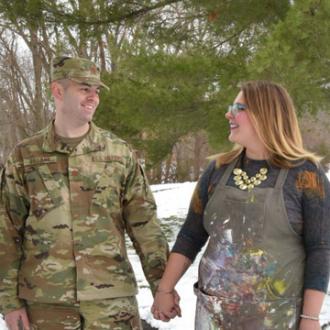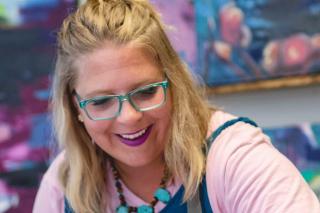Anne Villano '21MSW was awarded the 2022 Hanscom Air Force Base Military Spouse of the Year by the Armed Forces Insurance Program. Villano was selected for her candid approach to the mental health issues faced by members of the U.S. military and their families through creative therapies. We spoke to her about this work, and her advocacy for mental health in the military.
What led you to the School of Social Work at Simmons?
My journey to Simmons began during my undergraduate degree. I was looking for a fine art/graphic design program, and I distinctly remember visiting Simmons at the time. I ended up elsewhere, but thought that if I went back to school, I would want to be at Simmons.
Years later, I found myself in a mental health crisis. For five weeks, I attempted to navigate the military's mental health care system. I was infuriated by persistent logistical issues, ranging from an out of date directory, to referrals to doctors not accepting new patients. I followed protocol, but still had to continuously advocate for myself, which no one should have to do in that emotional state. I was frustrated not only for myself, but also on behalf of my fellow military spouses and service members. That experience ignited a flame within me to advocate for people and inspired my switch from Graphic Design to social work. I chose Simmons for my Master's in Social Work Online.
How did you find the courage to be honest about your mental health struggles?
It's just part of who I am – being told "this is just how we do it" isn't good enough for me. The military lifestyle can form this resiliency in some people, though at times the nature of the daily hardships have a heavy weight. I've experienced dark places, emotionally, and while it's hard to share things like this, it doesn't stop me. I therapeutically express that gift through my artwork.
In the military community, being vulnerable has a stigma of weakness. Seeking help takes courage. We are making strides in the right direction to finally acknowledge the stigma, and telehealth is making resources more accessible. But communication breakdown and follow-through has long been an issue in military life, and it causes misunderstandings about people's rights for mental health care.
What has art brought to your journey to better mental health?

Art is not something I do, it's a part of who I am. While I can be very outspoken now, that hasn't always been the case. In middle school, an English teacher stuck up for me, allowing me to use a sketchbook in class. She understood that I would listen while sketching, and her understanding and support changed my life.
My husband was deployed just after our daughter was born. I felt like I could go down a really dark road if I didn't start creating again. It made me wonder why we aren't using creative therapies more in the active duty military community. We know that art is healing, and you can take it everywhere you go. In my social work studies, I'm looking at how creative therapies can help people deal with trauma, especially those in the military community.
Tell us about Circle Sessions.
The bilateral movements you make when you draw a circle allows you to heal and process without speaking. In the Circle Session, you choose the medium and color to create your circle. While painting, you are guided in meditation to process your somatic experience, so the healing can happen in your body.
During an internship at the International Rescue Committee in Dallas, TX, I adapted Circle Sessions — initially for active duty military, military families, and veterans — to refugee populations, particularly people from Afghanistan. I am collaborating to bring an international art therapy program for refugees, Yesterday, Today, Tomorrow, to the U.S. for the first time. Given the shortage of interpreters, this is a powerful way to provide relief from somatic symptoms without needing to speak. Using art, drama, and movement, this program allows refugees to have a visual voice, to help with future thinking, aid in trauma processing, and to help close the gap in evidence for the efficacy of creative therapies.
We are currently testing this program on female refugees, and plan to addressissues such as financial independence and mental health stigma. Until I started working with refugees, I had never realized the similarities between this population and the military. I know what it's like to live on a military base and have the government rule your life, and have what politicians say on TV directly affect you. To have no choice in where you live or where your kids go to school, or to hear your spouse say they have to leave for seven months. Refugees experience trauma on an unfathomable level, especially those who helped us for decades in Afghanistan. They deserve what we promised them, and I want us to help those who helped us. I feel an innate kinship with these refugees that I hadn't expected.
What other work have you done with refugees?
My supervisor at IRC started a local SIV Sips program to connect Special Immigration Visa holders (SIVs) with veterans. SIVs are for people who aided the U.S. military, worked at embassies as translators, or assisted the US government in some capacity. They were promised SIV status, but despite having served in the military, many of them are given parolee status once they arrive in the US. Immigration courts are backlogged, and many are rightfully worried that they will be deported after one year. Twice per month, SIVs and veterans meet virtually to aid in the transitions that both groups are facing. Military members are especially grateful for what these refugees have done overseas.
How has Simmons prepared you to be a leader in your field?
Simmons has built my confidence. This has been a career shift for me, and the courses I've taken have allowed me to explore my identities and passions. In class we look at uncomfortable truths in society and discuss what we're going to do about them. The support I've received from professors has enabled me to share my experience in the military community.
I'm also happy to debunk common myths about military spouses. People often stereotype military spouses as having married their service members for the benefits, not having their own careers, or being uneducated. The fact is that there is a 24% unemployment rate among military spouses who are highly educated (projected to be even higher because of the pandemic). There is much more depth to the experience that I wish civilians could understand.
I met my husband years before he joined the military. I've committed to this lifestyle because my husband wants to serve his country, and it is a sacrifice. Over the 8 years he has served, I've been told "you knew what you were getting into." I find this heartbreaking and invalidating. When we married at 23, I didn't know what I was getting into. You have kids, or you move overseas, and the challenges are completely new. You can't know it until you live it.
What advice would you give someone wanting to incorporate art into their self care practice?
Don't think, just do! Starting is the hardest part, but once you find your own way of expressing and the way you want to create, that is the start of your personal journey.
If you are a veteran and would like to join the SIV Sips group, email Anne at [email protected]. You can also connect with her on Instagram, Facebook, Twitter, and LinkedIn.

